Related Research Articles

Philip Hauge Abelson was an American physicist, scientific editor and science writer. Trained as a nuclear physicist, he co-discovered the element neptunium, worked on isotope separation in the Manhattan Project, and wrote the first study of nuclear marine propulsion for submarines. He later worked on a broad range of scientific topics and related public policy, including organic geochemistry, paleobiology and energy policy.

Robert Jervis was an American political scientist who was the Adlai E. Stevenson Professor of International Politics in the Department of Political Science at Columbia University. Jervis was co-editor of the Cornell Studies in Security Affairs, a series published by Cornell University Press.

Homi Jehangir Bhabha, FNI, FASc, FRS(30 October 1909 to 24 January 1966) was an Indian nuclear physicist who is widely credited as the "father of the Indian nuclear programme". He was the founding director and professor of physics at the Tata Institute of Fundamental Research (TIFR), as well as the founding director of the Atomic Energy Establishment, Trombay (AEET) which was renamed the Bhabha Atomic Research Centre in his honour. TIFR and AEET served as the cornerstone to the Indian nuclear energy and weapons programme. He was the first chairman of the Indian Atomic Energy Commission and secretary of the Department of Atomic Energy. By supporting space science projects which initially derived their funding from the AEC, he played an important role in the birth of the Indian space programme.
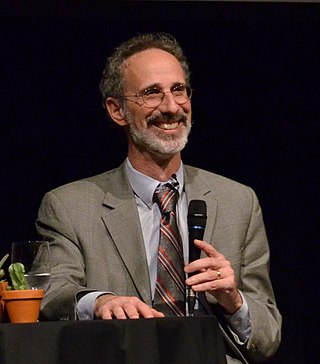
Peter H. Gleick is an American scientist working on issues related to the environment. He works at the Pacific Institute in Oakland, California, which he co-founded in 1987. In 2003 he was awarded a MacArthur Fellowship for his work on water resources. Among the issues he has addressed are conflicts over water resources, water and climate change, development, and human health.
Peter Douglas Ward is an American paleontologist and professor at the University of Washington, Seattle, and Sprigg Institute of Geobiology at the University of Adelaide. He has written numerous popular science works for a general audience and is also an adviser to the Microbes Mind Forum. In 2000, along with his co-author Donald E. Brownlee, he co-originated the term Rare Earth and developed the Medea hypothesis alleging that multicellular life is ultimately self-destructive.
Gavan McCormack is a researcher specializing in East Asia who is Emeritus Professor and Visiting Fellow, Division of Pacific and Asian History of the Australian National University. He is also a coordinator of an award-winning open access journal The Asia-Pacific Journal: Japan Focus.

Australia, officially the Commonwealth of Australia, is a country comprising the mainland of the Australian continent, the island of Tasmania, and numerous smaller islands. Australia is the largest country by area in Oceania and the world's sixth-largest country. Australia is the oldest, flattest, and driest inhabited continent, with the least fertile soils. It is a megadiverse country, and its size gives it a wide variety of landscapes and climates, with deserts in the centre, tropical rainforests in the north-east, tropical savannas in the north, and mountain ranges in the south-east.
William Leonard Gammage is an Australian academic historian, adjunct professor and senior research fellow at the Humanities Research Centre of the Australian National University (ANU). Gammage was born in Orange, New South Wales, went to Wagga Wagga High School and then to ANU. He was on the faculty of the University of Papua New Guinea and the University of Adelaide. He is a fellow of the Australian Academy of Social Sciences and deputy chair of the National Museum of Australia.

Thazha Varkey Paul is an Indo-Canadian political scientist. He is a James McGill professor of International Relations in the department of Political Science at McGill University. Paul specializes in International Relations, especially international security, regional security and South Asia. He served as the president of the International Studies Association (ISA) during 2016–2017, and served as the founding director of the McGill University – Université de Montreal Centre for International Peace and Security Studies (CIPSS).
T. J. Pempel is Jack M. Forcey Professor of Political Science (emeritus) at the University of California, Berkeley. He joined the UC Berkeley faculty in July 2001 and was also the director of the Institute of East Asian Studies from January 2002 until 2007. He held the Il Han New Chair in Asian Studies from 2001 to 2007. He retired in 2022.

Susan L. Shirk is an American political scientist and China specialist currently serving as a research professor at University of California, San Diego School of Global Policy and Strategy. She was Deputy Assistant Secretary of State in the Bureau of East Asia and Pacific Affairs at the U.S. State Department from 1997 to 2000 during the Clinton administration.

Nuclear weapons testing, uranium mining and export, and nuclear power have often been the subject of public debate in Australia, and the anti-nuclear movement in Australia has a long history. Its origins date back to the 1972–1973 debate over French nuclear testing in the Pacific and the 1976–1977 debate about uranium mining in Australia.
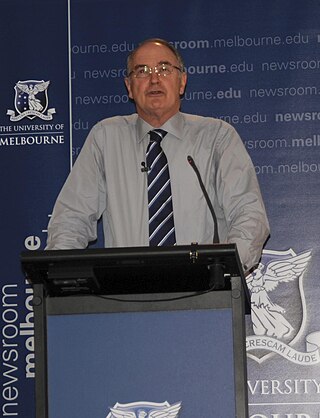
Ross Gregory Garnaut is an Australian economist, currently serving as a vice-chancellor's fellow and professorial fellow of economics at the University of Melbourne. He is the author of numerous publications in scholarly journals on international economics, public finance and economic development, particularly in relation to East Asia and the Southwest Pacific.
Anti-nuclear organizations may oppose uranium mining, nuclear power, and/or nuclear weapons. Anti-nuclear groups have undertaken public protests and acts of civil disobedience which have included occupations of nuclear plant sites. Some of the most influential groups in the anti-nuclear movement have had members who were elite scientists, including several Nobel Laureates and many nuclear physicists.
Jim Falk is a physicist and academic researcher on science and technology studies.
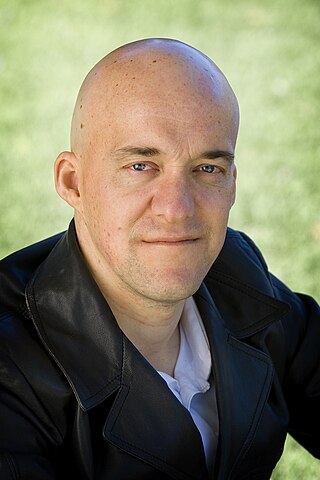
Barry William Brook is an Australian scientist. He is an ARC Australian Laureate Professor and Chair of Environmental Sustainability at the University of Tasmania in the Faculty of Science, Engineering & Technology. He was formerly an ARC Future Fellow in the School of Earth and Environmental Sciences at the University of Adelaide, Australia, where he held the Sir Hubert Wilkins Chair of Climate Change from 2007 to 2014. He was also Director of Climate Science at the Environment Institute.
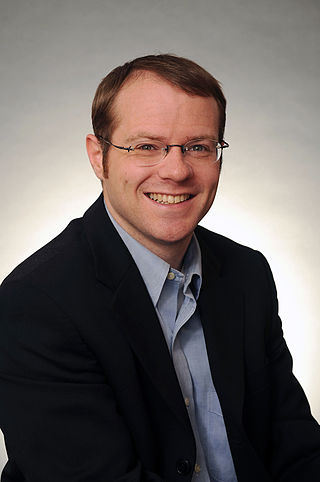
Benjamin K. Sovacool is an American academic who is director of the Institute for Global Sustainability at Boston University as well as Professor of Earth and Environment at Boston University. He was formerly Director of the Danish Center for Energy Technology at the Department of Business Development and Technology and a professor of social sciences at Aarhus University. He is also professor of energy policy at the University of Sussex, where he formerly directed the Center on Innovation and Energy Demand and the Sussex Energy Group. He has written on energy policy, environmental issues, and science and technology policy. Sovacool is also the editor-in-chief of Energy Research & Social Science.
The Conversation is a network of nonprofit media outlets publishing news stories and research reports online, with accompanying expert opinion and analysis. Articles are written by academics and researchers under a Creative Commons license, allowing reuse without modification. Copyright terms for images are generally listed in the image caption and attribution. Its model has been described as explanatory journalism. Except in "exceptional circumstances", it only publishes articles by "academics employed by, or otherwise formally connected to, accredited institutions, including universities and accredited research bodies".
Desmond John Ball was an Australian academic and expert on defence and security. He was credited with successfully advising the United States against nuclear escalation in the 1970s.
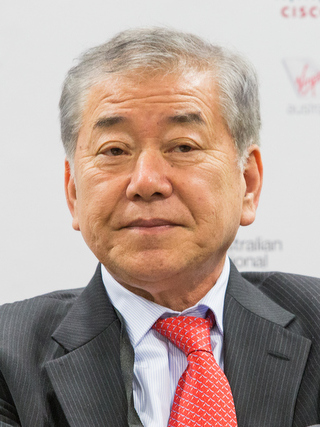
Moon Chung-in is a Special Advisor to President Moon Jae-in of South Korea for Foreign Affairs and National Security. He is also a Distinguished University Professor of Yonsei University, Krause Distinguished Fellow, School of Policy and Global Strategy, University of California, San Diego, and co-Convener of the Asia-Pacific Leadership Network for Nuclear Non-Proliferation and Disarmament (APLN). He is currently serving as the editor-in-chief of Global Asia. On 21 May 2017, Moon Chung-in was nominated by President Moon Jae-in as a special advisor on unification, diplomacy and national security affairs.
References
- 1 2 Nautilus Institute Staff Profile Peter Hayes , retrieved 7 April 2015
- ↑ "Conversation with Peter Hayes, p. 1 of 5".
- ↑ "Hayes, Peter". 21 March 2014.
- ↑ "Peter Hayes — Global Collaborative". Archived from the original on 2 December 2008. Retrieved 22 April 2010.
- ↑ "The Wave Magazine - Silicon Valley's Finest Entertainment & Lifestyle Magazine". Archived from the original on 12 November 2006. Retrieved 22 April 2010.
- ↑ "Conversation with Peter Hayes, p. 3 of 5".
- ↑ "Conversation with Peter Hayes, p. 4 of 5".
- ↑ Peter Hayes, March 2015, Founding Friends of the Earth Australia: the Early Years , Friends of the Earth Australia History Blog, retrieved 7 April 2015
